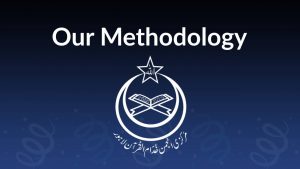Our Methodology
 Indeed, there are a number of parties and groups working throughout the Muslim world with the aim of bringing about an Islamic Revolution, or establishing an ideal Islamic state. The crucial point at which most of them differ is the methodology of the struggle. Some have taken the path of electoral politics, others have restricted themselves to the domain of educational and missionary work, some have been engaged in armed or even terrorist activities. So far, however, no group or party has achieved any noteworthy success.
Indeed, there are a number of parties and groups working throughout the Muslim world with the aim of bringing about an Islamic Revolution, or establishing an ideal Islamic state. The crucial point at which most of them differ is the methodology of the struggle. Some have taken the path of electoral politics, others have restricted themselves to the domain of educational and missionary work, some have been engaged in armed or even terrorist activities. So far, however, no group or party has achieved any noteworthy success.
We firmly believe that the theoretical and the practical guidance for reforming and revitalizing the Muslim Ummah, and specifically the correct methodology for bringing about an Islamic Revolution, can only be derived from the Seerah of Prophet Muhammad (SAW) and not from any other source. Imam Malik (RA) has said that the latter part of this community will not be reformed except by following the same process through which its initial part was reformed. This means that the goal of establishing the domination of Islam can be achieved only by following the methodology of Prophet Muhammad (SAW), keeping in view the present-day conditions, and for this we must study the life of Prophet Muhammad (SAW) and the manner of his struggle in detail.
He called people towards Islam, organized those who responded to his call, trained them in discipline and spiritual purification, made them pass through the stage of passive resistance in Mecca when they were not allowed to retaliate even in self-defense; it was only after the number was sufficient and a base was available in Medina that he took the initiative and challenged the Quraysh by blocking their trade route. The resulting armed conflict passed through many battles and finally led to the defeat of falsehood and the triumph of truth. The same methodology must be adopted today, using all the modern means of communication, dissemination, training, and organization that are available to us.
The title for this movement shall be nahi anil-munkar, i.e., the Islamic imperative to eradicate everything that is evil, wrong, unjust, or immoral. According to a well-known and oft-quoted tradition of Prophet Muhammad (SAW), there are three levels of this obligation depending on the availability of strength and resources, viz., eradicating evil with one’s hand (i.e., with force); eradicating evil with one’s tongue (i.e., through persuasion); and eradicating evil with one’s heart (i.e., by cultivating personal abhorrence against it). As long as the required strength is not available for us to carry out the highest level of nahi anil-munkar, we must continue to raise our voices against all un-Islamic practices that have become prevalent in Muslim societies. We must use all the available resources of mass communication to try and persuade the people in authority to eradicate these un-Islamic practices, and we must fulfill this duty to the best of our ability. However, once we have the necessary strength in terms of the number and training of committed individuals at our disposal, we shall move on to the highest stage of nahi anil-munkar and try to eradicate evil through force, i.e., by means of a popular resistance movement. We shall target a particular evil in society, and employ all the contemporary techniques of peaceful and non-violent agitation and civil disobedience to eradicate that evil, including street processions, public rallies, strikes, and sit-ins. We shall not damage any public or private property; we shall not attack anyone under any circumstances, but at the same time we shall be willing to lay down our own lives. Our willingness to sacrifice our own lives for the cause of Islam will be matched only by our firm refusal to hurt anyone or destroy anything.
